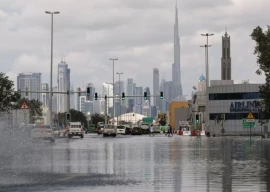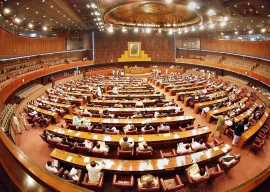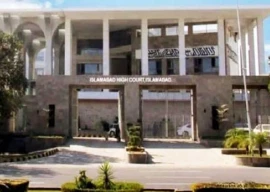
On Tuesday, the judges at the Sindh High Court (SHC) finally summoned the provincial chief secretary in person to explain why the city's roads and streets are not being cleared of illegal and unauthorised hurdles.
The bench, headed by Justice Nadeem Akhtar, was hearing identical petitions seeking the removal of illegal barricades from Sharae Kamal Ata Turk and other arteries in the city. The identical petitions were filed by Barrister Rashid Akhtar and Rana Faizul Hasan.
Akhtar had moved an application seeking the implementation on the court's directives passed in the early 90s to clear all sorts of hurdles on Sharae Kamal Ata Turk. The road remains closed for public during the assembly sessions as the large iron gates on it are closed.
Meanwhile, petitioner Hasan pointed out several areas and roads in Karachi have been blocked by placing barriers on the streets, which is a source of inconvenience to the citizens and affects their right to free movement. Armed guards take positions at all entry and exit points of different neighbourhoods and they question those who try to enter, he claimed.
He alleged that the law enforcement agencies had failed to perform their duties as there were clear directions from the Supreme Court to remove barriers and end no-go areas in the city. The Supreme Court, he recalled, also held that no-go areas could not be allowed in the country and nobody could be restrained from free access to public roads and areas, including private housing societies.
Besides, he submitted that despite a ban on graffiti in the city and the governor's directives to remove graffiti from government and semi-government buildings, no steps had been taken by the authorities against violators.
In August last year, the Rangers law officer had absolved the paramilitary force of the duty to remove unauthorised barriers from the streets and had also categorically held the civil administration responsible for such tasks.
During Tuesday's proceedings, the judges found out that no report had been submitted and no officials were present in court. Expressing their displeasure over the authorities' conduct, the bench directed the chief secretary to personally appear in court with a compliance report.
Published in The Express Tribune, January 28th, 2015.
COMMENTS (1)
Comments are moderated and generally will be posted if they are on-topic and not abusive.
For more information, please see our Comments FAQ













































Remove the barrier outside Karachi American School which serves no real purpose.